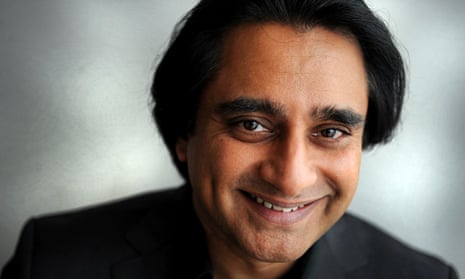My parents ended up in a refugee camp in Delhi after having to leave their much-loved homeland when 15 million people were displaced during the partition of India. Dad, Inderjit, arrived in Britain in 1956 followed by my mum, Janak, in 1960. They worked hard, paid their taxes and never relied on the state for handouts; I think people forget that migrants like them moved here for a reason: to work and to have a life.
My sister Sangeeta is five years younger than me and we all lived in a flat above my dad’s launderette in Hounslow, west London. Sangeeta would get away with a lot; she once struck me in the mouth with a recorder and I hit her back with a chair, which I’m not proud of, but we didn’t know any different then. As we grew up, we shared a love of the Beatles, Elvis and old movies. She’s the nicest person in the world.
I’ve inherited Dad’s work ethic, his sense of loyalty and duty. But my humour comes from my mum: Dad was a shift factory worker and he took on so many responsibilities to benefit his family, whereas Mum saw the funny side of life and the absurd. I see them every fortnight, which isn’t enough.
When I told Dad about becoming an actor, he replied, “It is pronounced doctor.” My uncle added, “Very few people make it as an actor – only Kirk Douglas and Burt Lancaster.” Years later, I discovered that Dad’s dream was to become a film director. He was only trying to protect me from that world because of the crushing disappointment he’d felt when he had to give it up for a secure job that would provide for his family. He also supported his widowed sister and her four children.
After I told Dad I was going to work in marketing he said, “This is a terrible job because you have to get up early and put up a stall.” He thought it was market trading and couldn’t understand my explanation. But, it was during my second job in marketing that I saw how proud he was of me. To my huge embarrassment, he told someone, “My son is starting on £17,000 a year.”
My wife, Meera [Syal], and I have been friends since we met on Goodness Gracious Me in 1996. We gradually found we had lots in common, but it was on a flight to Australia a few years later that I realised she was the one for me and we got married in 2005.
When Shaan was born nine years ago, I expected to burst into tears but I didn’t because I was too overwhelmed. The moment he appeared I said to him, “Oh, there you are; we’ve been talking to you for nine months and now you’re here.” Becoming a dad is a privilege and enlightening. I had this pathetic concern of, how am I going to be creative after this? Then I had a burst of creative energy and now I ask myself what did I do with my time before he was born? I must have been staring at the walls for hours every day. I also have a stepdaughter, Chameli, 22, and to see her relationship with Shaan is just a joy.
Shaan has inherited the family sense of humour meaning that funny can come from a noise, a look, a line – anything. He’s more bolshie than I ever was and more argumentative. I remember saying to him, “Do you want me to get angry?” He replied, “Have you tried not getting angry?”
Dad’s in his mid-80s and Mum is 79 and they are in good health. I hope they know they did a great job on their children; losing everything they had, coming here to start again and having to deal with me has all paid off. I can say to them, you did just fine.

Comments (…)
Sign in or create your Guardian account to join the discussion